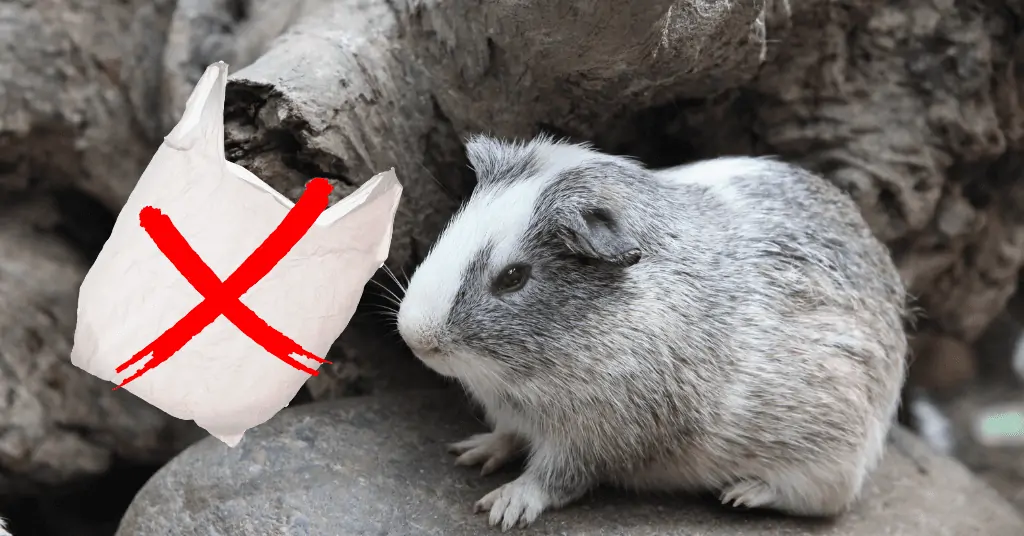“my guinea pig ate plastic, help!” is the most common question we get asked. while it may seem like a small thing, eating plastic can actually be very dangerous for your guinea pig. If your guinea pig has eaten plastic, here’s what you need to know to determine whether you need veterinarian assistance, Or if you can let it pass.

First, The reason why this could be considered an emergency
Plastic can block your guinea pig’s digestive system, which can cause a life-threatening condition called gastrointestinal stasis. This is when the digestive system slows down or stops working altogether, and can lead to dehydration, weight loss, lack of oxygen and blood flow (Ischemia), build-up of deadly bacteria, and death.
There 3 main types of impaction: Floating blockage, partial blockage, and full blockage.
A partial blockage is where something like plastic gets stuck in the digestive system, but isn’t actually blocking it. Most of the time this type of blockage may work itself out in a few days, but that doesn’t mean you should skip the vet visit.
A full blockage is when the thing that’s stuck (in this case, plastic) completely blocks the digestive system so nothing can pass through.
A floating blockage is when a foreign object, in this case, plastic, Is stuck in the stomach and too large to pass through to the intestines.
No matter what kind of blockage your guinea pig has, it’s important to take them to the vet right away. It’s not like you can possibly know for sure which kind of blockage it is without an x-ray.
All blockages are medical emergencies and need to be treated by a veterinarian as soon as possible.
At the vet, they will do an x-ray to see exactly where the blockage is and what kind it is. They will then decide on the best course of treatment, which may include surgery.

Types of plastic and the likelihood of complications when a guinea pig eats it
There are so many types of plastics out there, and not all of them are equal when it comes to the health of your guinea pig if they eat it.
The most common type of plastic that guinea pigs eat is bags, such as the ones you get chips in. These are made of oriented polypropylene. Small pieces aren’t very likely to cause a blockage.
The next most common type of plastic ingested by guinea pigs is bottle caps. These are made of high-density polyethylene and are more likely to cause a blockage than bags. It may also cause bleeding and anemia if it punctures the intestines.
The third most common type of plastic ingested by guinea pigs is toys. These can be made of anything from low-density polyethylene to rubber. These often cause blockages.
And there are so many other types of plastics out there, from straws to packing peanuts. All can cause blockages depending on size and type.

Signs to look out for that there may be a blockage or internal damage
When a guinea pig becomes impacted with a foreign body one of the first issues that will present is extreme abdominal pain, Followed by bruxism (Grinding of teeth), not wanting to move, or being unable to move, and anorexic.
They may drag their stomach or push it down towards the ground. The stomach itself may become distended or bloated.
Poop may still pass initially, however that’s just what was already ahead of the blockage, once that’s cleared out, No more will be able to pass.
The guinea pig may cry out when you touch its stomach or pick them up.
All of these signs are an absolute emergency and need to be seen by a veterinarian immediately.

When to let it pass on its own
If your guinea pig presents any of the symptoms of a blockage, the first thing you should do is take them to the vet.
Not all plastic is going to cause a blockage, but it’s hard to know for sure without an x-ray.
Just eating a small piece of bag or plastic might not constitute an emergency on its own, but if there’s any doubt whatsoever, it’s always better to err on the side of caution and take them in.
If the object is small and not causing any pain or other symptoms, the vet may just want to monitor your guinea pig closely and see if it passes on its own.
This is something that should only be done under veterinary supervision, as there is always a risk of complications, even with small objects.

How to prevent your guinea pig from getting an impactation
The best way to prevent an impaction is to not let your guinea pig have access to plastic. This means no more plastic bags, bottle caps, or toys.
You should also check their hay and bedding for any bits of plastic that may have snuck in.
The best toys for guinea pigs aren’t made of plastic, but of natural materials like wood or hay.

Bottom line
If you suspect your guinea pig has eaten plastic, the best thing to do is take them to the vet right away. It’s not worth taking the risk that they may develop a blockage.
Remember, all blockages are medical emergencies and need to be treated by a veterinarian as soon as possible.



